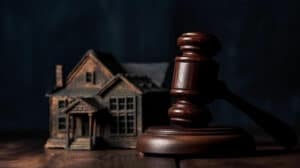Adverse Possession Laws Illinois
A squatter is basically someone who’s living on a property that they don’t legally own or have any right to.
In Illinois, these folks can actually gain some rights through what they call “adverse possession” laws.
Now, if you’re the property owner and you want to deal with an unwelcome guest on your turf, it’s important to know the deal and be able to tell the difference between squatters and trespassers.
Squatting vs. Trespassing in Illinois
- Squatters: These are folks who move into empty, foreclosed, or abandoned places without getting the green light from the property owner. They’re basically trying to stake a claim.
- Trespassers: Now, trespassers are different. They know they’re not supposed to be there, and they’re usually up to no good. It often involves breaking and entering, and these folks might have some shady intentions.
So, remember, if you’re in Illinois and you’ve got someone on your property you don’t want there, you need to know whether they’re a squatter or a trespasser to take the right action.
Illinois Adverse Possession Laws
 Adverse possession laws consist of the requirements and regulations established by the state to govern the process of making an adverse possession claim. These laws outline what a squatter needs to demonstrate to gain legal rights to someone else’s real estate property.
Adverse possession laws consist of the requirements and regulations established by the state to govern the process of making an adverse possession claim. These laws outline what a squatter needs to demonstrate to gain legal rights to someone else’s real estate property.
As an example, one of these laws states that a continuous occupation of 20 years is necessary for an adverse possession claim to be considered. Various other similar conditions must also be met before a property can be transferred to a squatter.
Adverse possession laws also provide guidance on how the owner of the property in question can take action to remove squatters if the need arises. To learn about Squatters laws across different states in the US, click on the link.
How Squatters Claim Adverse Possession in Illinois
Alright, adverse possession laws are like the rulebook for folks who want to take over someone else’s property they’ve been living on without permission. In Illinois, if someone’s in this situation, they’ve got to meet five main requirements. On top of that, they’ve gotta make sure property taxes have been paid, and there hasn’t been any use of the place for shady stuff like drugs or running a sketchy business.
- Actual Possession: This means the squatter has to act like they own the place. Moving in, taking care of the property, and treating it like it’s theirs is key. It’s like making a strong case that they’re the boss of that spot.
- Hostile Possession: Hostile possession might sound intense, but it’s basically about taking control of the property without the owner’s permission. Sometimes it can happen by accident, like if a neighbor builds a fence on their land without realizing it. But squatters usually know they’re trespassing and just act like they own the place.
- Open and Notorious Possession: The squatter can’t hide the fact that they’re living there. It should be crystal clear to anyone, especially the property owner, that they’re the ones in charge. No secret squatters allowed.
- Exclusive Possession: They’ve got to be the only ones calling the shots on that property. If the owner catches more than one squatter hanging around, the adverse possession claim goes out the window.
- Continuous Possession: They’ve gotta stick around for a solid 20 years straight in Illinois. No long vacations, no disappearing acts. If they leave for a while, they can’t claim adverse possession anymore.
So, that’s the lowdown on how squatters do their thing in Illinois when it comes to adverse possession. It’s a bit of a marathon, but that’s the deal.
Color of Title
Alright, so you might have heard folks talk about “color of title” like it’s the same as adverse possession, but they’re actually a bit different. Color of title is all about owning property in a not-so-normal way. The reasons for this irregularity can be all over the place, from property papers not being properly filed to important documents going missing.
Is Color of Title Required for an Adverse Possession Claim in Illinois?:
Nope, in Illinois, you don’t need to have color of title for an adverse possession claim, but having it can give you some nifty advantages.
Even though the color of title doesn’t directly change the outcome of an adverse possession claim, if you’ve got it and you’ve been paying your property taxes, you can shrink the time you need to occupy the place to just seven years. So, it’s like a shortcut for squatters with the color of title.
How to Evict Squatters in Illinois
So, if you own a property in Illinois and you find some folks who shouldn’t be there, here’s what you gotta do to make them leave without causing any trouble:
 Step 1: Call the police and let them know what’s happening. They’ll make a report to keep things official.
Step 1: Call the police and let them know what’s happening. They’ll make a report to keep things official.
Step 2: After that, you need to give the squatters a notice, like a formal letter, telling them they have to pack up and get out by a certain date. It’s kind of like giving them a heads-up.
Step 3: If the squatters are still hanging around after that date and won’t leave, you can take things to the next level by filing a lawsuit called an eviction lawsuit. This is where the court gets involved.
Step 4: The court will then look into whether these squatters can really say they own the place through something called “adverse possession.” If they can’t prove it with all the right requirements, they’ll be told to hit the road.
So, that’s how you handle squatters in Illinois the legal way. It might seem a bit complicated, but it’s all about following the rules to make sure everyone’s rights are respected.
Frequently Asked Questions
What to do if Squatters offer to pay rent?
Once a squatter begins paying rent, they transition into tenants. This shift can potentially make the eviction process more complicated if your intention is to remove the occupants rather than allow them to remain.

Does forcibly removing squatters from my property infringe upon their rights?
For your own safety and to avoid potentially violating their rights, it’s important not to handle the situation yourself. If squatters are refusing to leave, you should reach out to the local sheriff and allow them to handle the eviction process.
How does the payment of property taxes help safeguard me against an adverse possession claim?
Paying property taxes demonstrates your ownership of the property and serves as evidence that you haven’t entirely abandoned it to the squatters currently occupying it.




